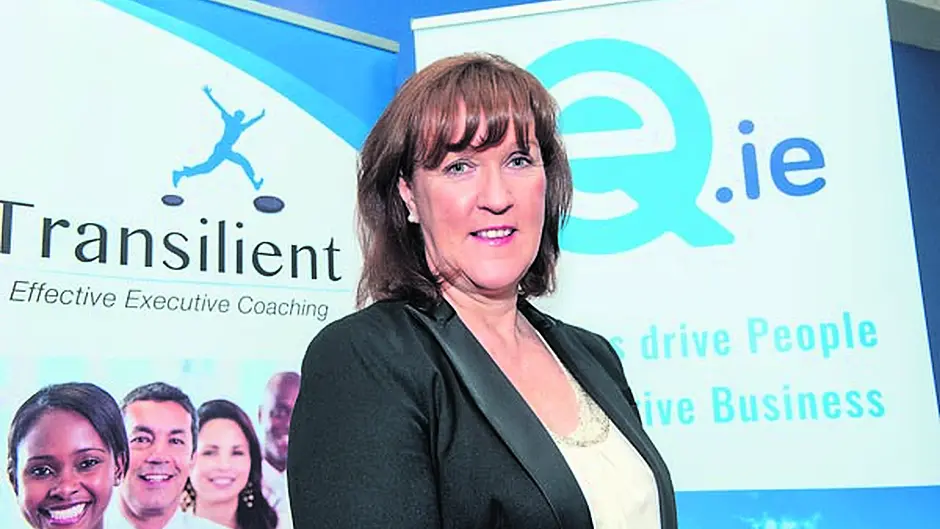Siobhan Cronin talks to Barbara Nugent of Resilient Coaching about her approach to dealing with conflict at work
ROWING comparisons come easy to leadership coach Barbara Nugent.
A member of ‘The Mothership’- a team of rowing ‘moms’ who decided to do their own rowing while waiting for their sons and daughters to finish training – she knows all about ‘pulling together’.
Although The Mothership operates out of Skibbereen, Barbara is Clonakilty-based, but loves the challenge of the increasingly popular water-based sport.
‘Working on a team is a bit like rowing. When you are all there together, you know if someone on the team isn’t pulling their weight,’ she says.
That one person not ‘pulling’ with the rest can often be seen by management as the ‘problem’ employee – but all is not lost, says Barbara, who is regularly called into companies to re-balance office dynamics.
With an expertise in ‘emotional intelligence’, Barbara loves the challenge of re-energising employees when their mojo seems to have left them.
Working with the entire team is usually the best way to address a problem with one, or two, individuals.
Observing interactions, seeing how the office politics works, and even finding out a bit about each person’s own story can all help to reinvigorate an office.
Barbara often spends one-on-one time with each employee in the team to see if she can discover what is broken.
‘Nobody is able to leave personal issues at the door of the office – we all bring them in, so sometimes knowing what is going on in a someone’s home life can help. Or maybe it’s a case of nobody having even asked them if something is wrong,’ she says, adding that nobody is ever singled out for treatment. It’s a very subtle process.
‘It might be they are in the wrong role. But that is okay, because they are going to be good at something else. It’s really about supporting each other.’
Barbara admits that she is good at seeing problems in a linear way and likes to approach issues in a very ordered fashion
She came to coaching almost by accident, having worked for PGI in Clonakilty for many years. ‘I was there for 12 years, since its start up, as vice-president for EMEA (Europe, Middle East, Africa) and India.’
But, through dealing with many teams of people, all with their own diverse personalities, she learned a lot about people skills.
‘Sometimes it was more of a HR function, managing people and solving a lot of problems.’ Eventually, she decided she wanted to get a qualification in that area, so she completed an IMI post-grad diploma in leadership, going to Dublin three days every month.
Since then she has achieved post grad diplomas in organisational behaviour, executive coaching and a masters in business practice. ‘And a ton of real life business experience,’ as she says herself.
She is also accredited by the European Mentors and Coaching Council meaning she also has a strict code of ethics to follow, covering issues like confidentiality and conflict of interest.
These days she troubleshoots for big firms in Cork like Musgrave, The Salon Shop and DePuy, by helping them to make their teams more effective and efficient.
Delegation is a huge issue for some managers, she says, adding that it was something she had grappled with herself in her former career. ‘But I now know that if you are not delegating, you are also holding back your own staff, as well as yourself.’
Although, in general, workforces are the same the world over, the Irish are particularly bad at confronting problems. ‘We don’t like conflict. But with something like bullying, for example, you have to get involved as early as possible, and not let things fester. Many managers think “I’ll leave it be, it’ll work itself out, it’ll be fine” but, she points out, it rarely is.
Some people are so unhappy in their work that they contact her themselves for advice and coaching. She often recommends that they find someone at work who they look up to, and suggest they mentor them. ‘And people love being asked to be mentors,’ she notes, so it benefits both parties.
Sometimes the calls she gets are from the managers themselves. ‘People forget that managers can find it very lonely at the top. They feel they don’t have someone to talk to, so a coach is seen as an independent voice, that can help them find a solution.’
She hints that, in the past, the term ‘emotional intelligence’ wasn’t taken seriously – a bit ‘touchy, feely’ for the corporate world.
‘But now managers realise that making people more emotionally intelligent can make them better leaders, too.’
All our problems at work stem from ‘human issues’ at the end of the day. And while women often lack confidence and men are poor at empathy, in general, our issues are very often similar, she said.
Contact Barbara at [email protected]. or 086 848 1679.








